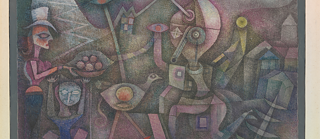|
6:30 PM-9:00 PM, IST
Modernism & Abstraction: India, Germany and Switzerland
Webinar | Webinar
-
Online Online
- Language English
- Price Free

8am-10:30am EST / 1pm-3:30pm GMT / 2pm-4:30pm CET / 6:30-9pm IST
There will be a break and time for discussion at the end.
Join here: https://us06web.zoom.us/j/86038475176?pwd=92y8QkSy8U8lgAKOGjHfmBJ92KznTV.1
What if we wrote the history of art as if Paul Klee was from India, or Prabhakar Barwe was Swiss-German? What would it mean to write art history as a mutually intertwining set of relations, working free of national points of origin? How might we challenge core art historical concepts such as influence, chronology and the development of artistic styles?
In this second webinar of the series “Exploring Modernisms”, art historian Rebecca M. Brown (Johns Hopkins University, Maryland) will explore these “as if” propositions by unfolding modernism and abstraction as global phenomena, with a focus on India and Germany/Switzerland. In many common understandings of art history, ‘Western’ modern art shaped distinct, separate modernisms outside of Europe and the US which were then seen as always behind, always imitating what came before, always fighting for originality. Opening up a more complex view, this keynote will dive into ideas of interdependencies, errant encounters and the movement of ideas across the 20th century with a particular focus on the nodes of Germany/Switzerland and India. How do artists grapple with similar problems—of abstraction, of language and communication, of relating to an interrupted, fragmented history, of finding the vibrancy in minority cultures? By thinking against the grain, thinking an Indian Klee and a Swiss-German Barwe, what new, radical maneuvers across modernism and abstraction will we find?
Following the presentation, art historian Jo Ziebritzki (Ruhr-Universität Bochum) will join the discussion and bring her expertise on global modernism, the history of art history itself and queer-feminist thinking.
Speaker: Rebecca M. Brown (Johns Hopkins University, Maryland)
Discussant: Jo Ziebritzki (Ruhr-Universität Bochum)
About the Speakers:
Rebecca M. Brown is Professor of the History of Art and Chair of Museum Studies and Cultural Heritage Management programs at Johns Hopkins University. She specializes in colonial-era and modern art, architecture, and visual culture, with particular expertise in South Asia. She has published numerous articles, three books, and six co-edited volumes. She is currently thinking with the southern Indian painter KCS Paniker (1911–77), tracing his errant journey to unfold a language of painting in the 1960s and 1970s.
Jo Ziebritzki works as research assistant at the art historical institute, Ruhr-Universität Bochum. Her research focuses on the history of art history, the formation of the discipline, and transcultural and queer-feminist artistic modernism. Ziebritzki has published articles on these topics in journals such as Kritische Berichte, Journal of Art Historiography, Grey Room, and Kunst und Politik and a book on Stella Kramrisch, Kunsthistorikerin zwischen Europa und Indien. Ein Beitrag zur Depatriarchalisierung der Kunstgeschichte (Marburg 2021). She held fellowships at the Zentralinstitut für Kunstgeschichte (Munich) and the Warburg Institute (London). Ziebritzki is co-founding member of the DFG (German Research Foundation) network Paths - Methods - Critiques: Women Art Historians 1880-1970.
Location
Online